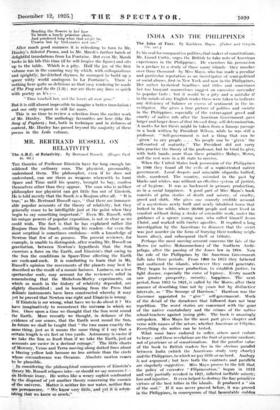MR. BERTRAND. RUSSELL ON RELATIVITY
.-• The A.B.C. of Relativity. By Bertrand Russell. 4s. 6d.) (Began Paul-
ME theories of Professor Einstein have for long enough be- Wildered the ordinary man. The physicist, presumably, tuiderstood.. them. The philosopher, even if he does not understand,. can use them as weapons wherewith to hunt Space and Time until his quarry, brought to bay, confess themselves other than they appear. The man who is neither 'philosopher nor physicist can get little fun out of Einstein. He is told merely that the Snark is a Boojum after all. " It is 'true," as Mr. Bertrand Russell says, " that there are innumer- able popular accounts of the theoty of relativity, but they ieherally cease to be intelligible just at the point when they :begin to say something important." Even Mr. Russell, with his unique poweis of popular exposition, is not so clear as we could wish. The fact is that he has explained rather. the Boojum than the Snark, crediting his readers—for even the most sceptical is sometimes credulous—with a knowledge of Newton that few of us possess. The present reviewer, for example, is unable to distinguish, after reading Mr. Russell on graVitation, between Newton's hypothesis that the Sun exercises a force on the Earth,. and Einstein's that owing to the Sun the conditions in Space-Time affecting the Earth are such-and-such.-- It is comforting to learn that in Mr. Russell's opinion the movements of the planets may best be described as the-result of a cosmic laziness. Laziness, on a less spectacular scale, may account for the reviewer's relief in remembering that the Michelson-Morley experiments, on which so much in the history of relativity depended, arc slightly discredited ; and in learning from the Press that delicate instruments have been constructed whereby it may yet be proved that Newton was right and Einsitein is wrong.-- If Einstein is not wrong, what have we to do about it ? We have imaginatively to reconstruct the itniVerae in which we live. Once upon a time we thought that the Sun went round the Earth. More recently we thought, in defiance of the _evidence of our senses, that the Earth went round the Sun: in--futtire we shall be taught that " the two mean exactly the same thing, just as it means the same thing if I say that a certain length is six feet or two yards. Astronomy is easier if we take the Sun as fixed than if we take the Earth, just as- litecatints are-easier in a decimal coinage." The little charts ef Mercury, Venus and Terra moving along dotted lines about a blazing yellow hub •beeome no less archaic than the circle whose circumference was Oceanus. Absolute motion ceases to-
be plausible. ..
In considering the philosophical consequences of Einstein.'s theory Mr. Russell relapses into—or should we say recovers ?-- a -Hellenic irony. He writes like a weary sophist confronted by the disproof of yet another theory concerning the essence Of-the universe. Matter is neither fire nor water, neither flux nor permanence:_ We:It4oW very little, and Vet it iS aston- ishing that' Ite knOw so niuchi"






















































 Previous page
Previous page